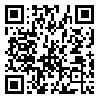Volume 12, Issue 3 (9-2022)
J Health Saf Work 2022, 12(3): 652-663 |
Back to browse issues page
Download citation:
BibTeX | RIS | EndNote | Medlars | ProCite | Reference Manager | RefWorks
Send citation to:



BibTeX | RIS | EndNote | Medlars | ProCite | Reference Manager | RefWorks
Send citation to:
Jahani D, Jabbarzadeh Tabrizi F, Dadashzadeh A, Sarbakhsh P, Hosseinzadeh M. Career Adaptability and its Correlation with Quality of Work Life in Nurses Working in the Emergency Department. J Health Saf Work 2022; 12 (3) :652-663
URL: http://jhsw.tums.ac.ir/article-1-6746-en.html
URL: http://jhsw.tums.ac.ir/article-1-6746-en.html
Delnia Jahani1 
 , Faranak Jabbarzadeh Tabrizi *
, Faranak Jabbarzadeh Tabrizi * 
 2, Abbas Dadashzadeh3
2, Abbas Dadashzadeh3 
 , Parvin Sarbakhsh3
, Parvin Sarbakhsh3 
 , Mina Hosseinzadeh4
, Mina Hosseinzadeh4 


 , Faranak Jabbarzadeh Tabrizi *
, Faranak Jabbarzadeh Tabrizi * 
 2, Abbas Dadashzadeh3
2, Abbas Dadashzadeh3 
 , Parvin Sarbakhsh3
, Parvin Sarbakhsh3 
 , Mina Hosseinzadeh4
, Mina Hosseinzadeh4 

1- Department of Medical Surgical Nursing, Faculty of Nursing and Midwifery, Tabriz University of Medical Sciences, Tabriz, Iran
2- Department of Medical Surgical Nursing, Faculty of Nursing and Midwifery, Tabriz University of Medical Sciences, Tabriz, Iran ,jabbarzadehf@tbzmed.ac.ir
3- Department of Statistics and Epidemiology, Faculty of Health Science, Tabriz University of Medical Sciences, Tabriz, Iran
4- Department of Community Health Nursing, Nursing and Midwifery Faculty, Tabriz University of medical sciences, Tabriz, Iran
2- Department of Medical Surgical Nursing, Faculty of Nursing and Midwifery, Tabriz University of Medical Sciences, Tabriz, Iran ,
3- Department of Statistics and Epidemiology, Faculty of Health Science, Tabriz University of Medical Sciences, Tabriz, Iran
4- Department of Community Health Nursing, Nursing and Midwifery Faculty, Tabriz University of medical sciences, Tabriz, Iran
Abstract: (1180 Views)
Introduction: Nurses of the emergency department experience stressful events that affect their mental health and reduce the quality of their work life. Career adaptability is considered a personal capability that enables employees to adapt to changes and avoid the negative consequences of job mismatch. This study was conducted to study career adaptability and its correlation with the quality of work life in the emergency department.
Material and Methods: This descriptive-correlational study was conducted on 104 nurses in the emergency department of teaching–therapeutic hospitals in Tabriz who were selected using random stratified sampling. Data was collected using a demographic checklist, the Career Adapt-Abilities Scale (CAAS) by Savickas, and the Quality of Nursing Work Life (QNWL) scale by Brooks & Anderson. Data were analyzed in SPSS using descriptive statistics (frequency, mean and standard deviation) and inferential statistics (independent t-test, one-way analysis of variance, Pearson’s correlation coefficient, and linear regression analysis).
Results: The total scores of career adaptability and the quality of nursing work life were 88.55±25.01 from the achievable range of 24-120 and 141.15±22.56 from the achievable range of 42-252, respectively, which were moderate. In this study, 85.6% of nurses enjoyed a moderate quality of work life. Furthermore, the results of Pearson’s correlation indicated a significant positive correlation between career adaptability and scopes with the quality of work life score (p=0.05). Regression analysis results indicated that career adaptability significantly predicts the quality of nursing work life (p=0.000).
Conclusion: In this study, nurses experienced moderate career adaptability and quality of work life. Given the above factors, and considering adaptability as a variable predicting quality of work life, it is suggested to take measures to increase career adaptability in nurses through training or consulting interventions to improve the quality of nursing work life.
Material and Methods: This descriptive-correlational study was conducted on 104 nurses in the emergency department of teaching–therapeutic hospitals in Tabriz who were selected using random stratified sampling. Data was collected using a demographic checklist, the Career Adapt-Abilities Scale (CAAS) by Savickas, and the Quality of Nursing Work Life (QNWL) scale by Brooks & Anderson. Data were analyzed in SPSS using descriptive statistics (frequency, mean and standard deviation) and inferential statistics (independent t-test, one-way analysis of variance, Pearson’s correlation coefficient, and linear regression analysis).
Results: The total scores of career adaptability and the quality of nursing work life were 88.55±25.01 from the achievable range of 24-120 and 141.15±22.56 from the achievable range of 42-252, respectively, which were moderate. In this study, 85.6% of nurses enjoyed a moderate quality of work life. Furthermore, the results of Pearson’s correlation indicated a significant positive correlation between career adaptability and scopes with the quality of work life score (p=0.05). Regression analysis results indicated that career adaptability significantly predicts the quality of nursing work life (p=0.000).
Conclusion: In this study, nurses experienced moderate career adaptability and quality of work life. Given the above factors, and considering adaptability as a variable predicting quality of work life, it is suggested to take measures to increase career adaptability in nurses through training or consulting interventions to improve the quality of nursing work life.
Type of Study: Research |
Received: 2022/09/25 | Accepted: 2022/09/1 | Published: 2022/09/1
Received: 2022/09/25 | Accepted: 2022/09/1 | Published: 2022/09/1
Send email to the article author
| Rights and permissions | |
 |
This work is licensed under a Creative Commons Attribution-NonCommercial 4.0 International License. |





